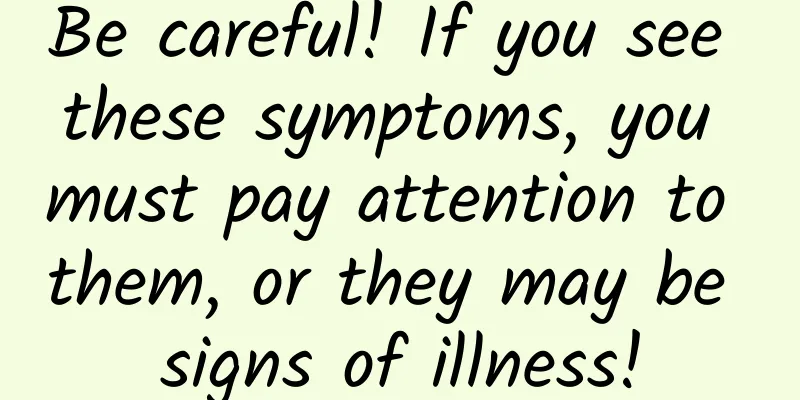Be careful! If you see these symptoms, you must pay attention to them, or they may be signs of illness!

|
Reviewer of this article: Chen Sijiao, Chief Physician of Geriatric Cardiology, First Affiliated Hospital of China Medical University, Professor As the physical functions of the elderly decline, discomfort symptoms in various parts of the body gradually increase. Some of these are important signs of disease and need to be taken seriously, identified and treated early to maintain good health. Lower limbs numbness and pain when walking Guo Lianrui, director of the Department of Vascular Surgery at Xuanwu Hospital, Capital Medical University: If the elderly feel cold legs and feet, sore lower limb muscles, and need to rest before walking again after walking for a while, they need to be alert to whether they have lower limb arteriosclerosis obliterans. If plaques in the lower limb arteries cause stenosis or occlusion of the lumen and insufficient blood supply to the legs, symptoms such as cold, numb, and weak legs, muscle pain or cramps (occurring after walking and relieved after rest) may occur, which can easily be confused with signs of leg aging or lumbar disc herniation. Copyright image, no permission to reprint Elderly people with lower limb ischemia often have coronary heart disease, hypertension, diabetes and other diseases, and their physical condition is weak, so they need to choose appropriate treatment methods according to their condition. If the symptoms are not too serious, medication can be used to promote collateral circulation; if the condition is more serious, minimally invasive intracavitary surgery, bypass surgery and other methods can be used under the guidance of a doctor to avoid rapid worsening of the condition. Remind such elderly people to pay attention to controlling risk factors such as hyperlipidemia, hypertension, and diabetes in daily life, take good care of their feet, and avoid ulcers. Dark shadows and mist in front of my eyes Liu Dachuan, director of the Department of Ophthalmology at Xuanwu Hospital, Capital Medical University: Some elderly people have floating shadows in front of their eyes, or their vision is blocked by a layer of fog. In addition to floaters and cataracts, they also need to pay attention to vitreous hemorrhage. Floaters are vitreous opacities, which are related to age and manifest as dark shadows in front of the eyes, but most of them do not cause visual impairment. If the amount of vitreous hemorrhage is small, similar symptoms will occur, but if not treated in time, it can cause retinal detachment and affect vision. Copyright image, no permission to reprint When the amount of vitreous hemorrhage is slightly more, there may be a sense of obstructed vision, which can easily be confused with cataracts. Timely treatment is required to avoid irreversible damage to vision. In daily life, the elderly should avoid rapid eye movement, rubbing eyes vigorously, and other actions to avoid pulling the vitreous body and causing retinal damage. After treatment and eliminating the obstruction of the fundus by bleeding, pay attention to identifying the primary cause of the bleeding, such as age-related macular degeneration, diabetic retinopathy, retinal vein occlusion, etc., and take targeted surgical treatment to restore vision to varying degrees. Runny nose and cough with bloody sputum Wang Zhenlin, director of the Department of Otolaryngology and Head and Neck Surgery at Xuanwu Hospital, Capital Medical University: Runny nose and bloody sputum are common symptoms in life. If they occur repeatedly and do not heal for a long time, the elderly need to pay attention to whether there are problems such as skull base tumors. Most nasal and throat mucosal bleeding is related to inflammation or mucosal dryness and can be cured with simple targeted treatment. However, bleeding caused by tumor destruction is usually difficult to heal, especially when combined with symptoms such as headache, unilateral nasal congestion, and unilateral cranial nerve paralysis (such as facial numbness, decreased vision, loss of smell, hoarseness). The neurological function and general condition of the elderly are impaired. The above-mentioned symptoms are not equal to evidence. Direct observation of the nasal cavity, pharyngeal cavity, ear canal, etc. through endoscopy, or diagnosis through high-resolution CT, MRI, etc. are also needed. Copyright image, no permission to reprint For patients with swelling and pain confirmed by the above examinations, for elderly patients, especially the very old, endoscopic minimally invasive treatment and particle radiotherapy suitable for the elderly can be the first choice under the guidance of a doctor. During the treatment and rehabilitation stage, it is recommended to actively train mouth opening, swallowing and facial muscle movements in the early stage, which is very helpful in restoring the quality of life. Changes in diet and bowel movements Liu Dongbin, director of general surgery at Xuanwu Hospital, Capital Medical University: As the body ages, in addition to degenerative manifestations such as decreased swallowing function, poor digestion ability, and poor appetite, the elderly should also pay attention to these gastrointestinal disease signals. For example, loss of appetite, abdominal discomfort, rapid weight loss in a short period of time; nausea and vomiting, abdominal distension, bloody stools, black stools; jaundice of the skin or sclera, dark tea-colored urine, clay-colored stools; a hard lump felt in the abdomen; changes in bowel habits, constipation or diarrhea, etc. Elderly people with a history of gastric ulcer, gastrectomy, hepatitis B, hepatitis C, alcoholic hepatitis, long-term large gallstones, and repeated cholecystitis need to be more wary of elderly gastrointestinal tumors. Copyright image, no permission to reprint The elderly often have other systemic diseases. It is recommended that they receive comprehensive multidisciplinary evaluation and guidance, choose a treatment method that suits their physical condition, such as minimally invasive laparoscopic surgery, and move and eat as soon as possible after surgery. They should also monitor their physical condition regularly as ordered by their doctor and resume normal life as soon as possible. Lower abdominal pain and back pain Wang Shijun, Director of the Department of Obstetrics and Gynecology at Xuanwu Hospital of Capital Medical University: I often feel pain in my lower abdomen and soreness in my lumbar region, and it feels like something is falling out. Is it because my waist is not in good condition due to my age? In fact, it may be related to the pelvic floor muscles. Older women often have weakened pelvic floor tissue elasticity and support, which makes them more susceptible to pelvic organ prolapse. For this degenerative disease, prevention is recommended. Pelvic floor muscle exercises can be performed at home, and the anus and vagina can be contracted repeatedly (without using abdominal muscles or thigh muscles) to strengthen the pelvic floor muscle tissue. Avoid excessive fatigue and long-term weight bearing in daily life, and actively treat diseases that cause chronic increased abdominal pressure, such as chronic cough and constipation, to improve or delay the further development of prolapse. Bleeding, leucorrhea, lower abdominal pain Wang Shijun, director of the Department of Obstetrics and Gynecology at Xuanwu Hospital, Capital Medical University: Even as they age, gynecological diseases are not far away from the elderly. There are several symptoms that deserve special attention. The first is postmenopausal vaginal bleeding, which may have different manifestations in terms of bleeding volume, color, and accompanying symptoms. The second is abnormal leucorrhea, such as rice soup-like, watery, or bloody leucorrhea with a foul odor. The third is lower abdominal pain, as well as the feeling of a mass in the abdomen, abdominal distension, and weight loss. Copyright image, no permission to reprint If the elderly find one or more of the above symptoms, it is recommended to see a doctor to check the cause, which may be endometritis, vaginitis, pelvic inflammatory disease, or endometrial cancer, cervical cancer, fallopian tube cancer, etc. Elderly people often have chronic diseases such as hypertension, diabetes, heart disease, etc., and their body tolerance is poor. Targeted treatment is required according to physical fitness and symptoms. In life, it is recommended that the elderly actively treat gynecological diseases such as senile vaginitis, develop good hygiene habits, have regular gynecological examinations every year, and maintain good health. Source: Health Times (ID: jksb2013) The watermarked images in this article are from the copyright gallery, and the image content is not authorized for reprinting |
<<: We may have got the tongue's taste map wrong
Recommend
NASA will pay you a high salary if you stay in this house for a year
On July 6, 2024, in Houston, USA, four volunteers...
iOS 17.0.1 battery life test results are out, and it crashes again!
A few days after the official release of iOS 17, ...
Procreate Drawing Lesson
Procreate painting course resources introduction:...
My fission methodology is inseparable from these three core elements!
I once wrote the operational procedures for poste...
How to reduce costs and increase conversion rates when doing Baidu bidding promotion?
There are always many problems on the road of bid...
Youpengpule: To do TV e-commerce well, we must start with "babies"
As a new medium in the digital age, Internet TV i...
In which direction is Wenchang located in 2020?
In 2020, Wenchang is located in the south of Li P...
Watch Control: Build a bridge between you and Android Wear
A week ago, after watching the Apple Watch launch...
MG India focuses on sustainable development to build a green travel ecosystem SAIC Motor and India's JSW Group sign a strategic cooperation agreement
(Shanghai, November 30, 2023) Recently, SAIC Moto...
Will drinking ice water often hurt your stomach? Will drinking hot water be fine?
Reviewer of this article: Chen Haixu, Deputy Dire...
A picture to understand the front-end performance optimization of Html5
Overview 1. PC optimization methods are also appl...
Subvert your cognition: the probability of flipping a coin is not 50%
Audit expert: Liu Yuhang PhD, Beijing Internation...
A fire broke out in a primary school in Fengtai District, Beijing, due to a fire in the canteen oil pan! How to eliminate kitchen safety hazards →
According to @Beijing Fengtai Fire Department, at...
Android is destroying open source, and it's not just Huawei that's affected
Not long ago, Huawei's consumer business CEO ...
Increase fans! 6 practical ways to increase followers, I will teach you all of them today!
I have summarized 6 effective ways to increase fo...









